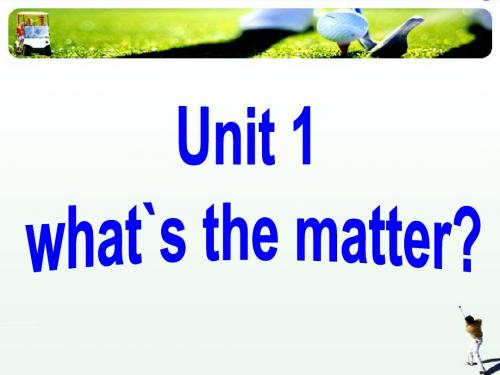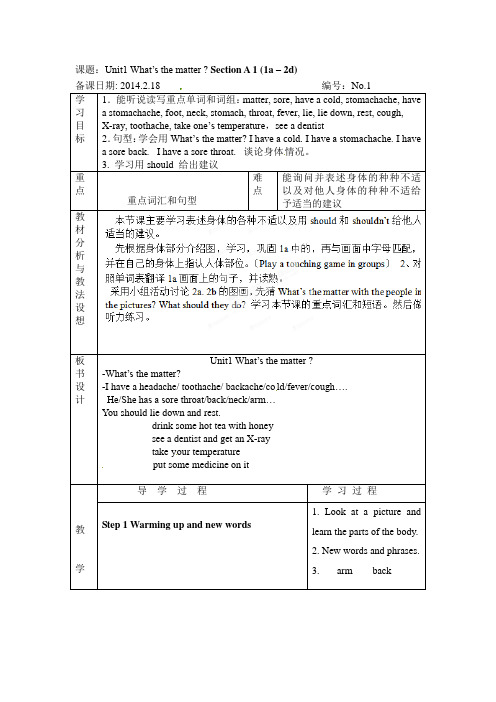人教版八年级英语下Unit1What'sthematterSectionA1a-2d公开课教学共
- 格式:ppt
- 大小:10.45 MB
- 文档页数:29





人教版八年级下册各单元重点单词笔记Unit1 SectionA1.mattern.问题;事情(1)询问某人的情况=problem重点句型怎么了? What’s the matter (with sb.)? 注意这里的the必须要加What’s wrong with sb.? What’s up? What’s the problem/trouble with sb.?互换(2)表示一个问题或一件事情e.g. They had some important matters to discuss.(3)关于...的问题a matter of sth./doing sth.e.g. Making a plan is a matter of choosing the best time and activities.补充:no matter who/what/when/where 无论...v.有影响matter to sb. 对某人有影响It doesn’t matter to me what you do. 你做什么对我没影响(你做什么我无所谓)2.重要的名词(身体部位)(下列均可数)arm n. 手臂back n. 背,背部ear n. 耳朵eye n. 眼睛foot n. 脚(复数为feet)hand n. 手head n. 头leg n. 腿mouth n. 嘴巴neck n. 脖子nose n. 鼻子stomach n. 胃tooth n. 牙齿(复数为teeth)3.表达生病的用法总结(用have表示得了某种病)(1)have a +疾病名称have a cold/fever/cough 感冒/发烧/咳嗽发高烧have a high fever He is coughing (2)have a +部位+ache n.表示疼痛have a stomach ache/tooth ache/head ache(3)have a +sore adj. 疼痛的;酸痛的+疼痛部位have a sore throat/back——have a very /really sore throat/back√4.liev. ①躺lie-lying-lay-laine.g. As long as you lie down and rest, you will feel much better tomorrow.The bus driver saw an old man lying on the side of the road.①撒谎lie-lying-lied-liede.g.lie to sb. 对某人说谎Don’t lie to me!n. 谎言tell a lie5.restn. ①休息时间(睡眠时间)have/take a good rest①剩余部分;其余the rest of sth.e.g. I would like to spend the rest of my life living with you.v. =relax 休息;放松e.g. Rest your eyes every half an hour.He won’t rest until he finds her.6.breakv. break-broke-broken已学,之前笔记有n. 间歇,休息,暂停(指短暂地歇了一下)①lunch/tea/class break 午饭/下午茶/课间的休息时间①take a break/ take breaksHe worked all day without a break=He worked all day without taking a breakYou need to take breaks away form the computers.7.hurtv. hurt-hurt-hurt①hurt sb./hurt oneself 使疼痛;使受伤He hurt his back /himself when he played tennis outside.If your head and neck still hurt tomorrow, then go to the doctor.①hurt oneself doing sth. 做某事弄伤了自己John hurt himself cutting up the carrots.①hurt one’s feeling 伤害某人的感情/使不快It hurt me to know that he lied to me.adj. 受伤的None of the passengers were badly hurt.8.off adv./prep. 本身意义一般指远离,主要总结含有off的动词短语get off 下车-get on 上车turn off 关上-turn on 打开take off 脱下;飞机火箭的起飞发射put off 推迟cut off 切除take/have three days off 请三天假9.to one’s surprise 一般位于句首,单独用(逗号隔开)10.onto prep. 本身意义一般指朝,向e.g. Some passengers helped Mr.Wang to move the man onto the bus11.troubleUCN(不可数名词). 困难;苦恼e.g. People don’t want to help others because they do not want any trouble.①be in trouble处于困境中Although we are in trouble, we won’t give up.e.g. Now he is in trouble, we should try our best to help him①get (sb.) into trouble (使某人)陷入困境中e.g. If I don’t arrive home on time, I’ll get into trouble!My brother always gets me into trouble with my parents.①have trouble with sth.=have trouble (in) doing sth.做某事有困难e.g. His son had trouble (in)working out the math problem.I had trouble in understanding the meaning of the word.补充:同义的还有have difficulties/problems with sth.=have difficulties/problems (in) doing sth. trouble也可做可数名词,意思是一件麻烦事,烦心事V. 使烦恼,使忧虑;麻烦某人trouble sb.e.g. Sorry to trouble you, but could you tell me the time?What is troubling you these days?12.hitV. hit-hit-hit击;打;撞击①hit sb. (with sth.)e.g. Bus No.26 hit an old man on Zhonghua Road.My parents never hit me when I was a child.①hit sb. +prep.+ the 身体部位hit me on the head/hit him in the facee.g. She hit him on his head with her umbrella.补充:hit常用于被动语态be done e.g. I was hit by a stone.13.right away =at once= in a minute= immediately 立刻;马上The old man had a heart problem and needed to go to the hospital right away.。

UNIT 1 What's the matter?Section A (1a-4c)重点单词1. toothache n. 牙痛2. matter n. 问题,事情3. stomachache n. 胃痛,腹痛4. break n. 间歇,休息5. fever n. 发烧6. cough n. & v. 咳嗽7. throat n. 咽喉,喉咙8. lie v. 躺,平躺9. rest v. & n. 放松,休息10. Xray n. X射线,X光11. headache n. 头痛12. neck n. 颈,脖子13. hurt v. 使疼痛,受伤14. passenger n. 乘客,顾客15. off adv. & prep. 离开,不工作 16. trouble n. 问题,苦恼17. foot n. 脚,足18. onto prep. 向,朝19. herself pron. 她自己词形变换1. health—healthy (形容词)—unhealthy (反义词)2. break—broke (过去式)—broken (过去分词)3. lie—lay (过去式)—lain (过去分词)—lying (现在分词)4. hurt—hurt (过去式)—hurt (过去分词)5. foot—feet (复数)6. stomach—stomachs (复数)重点短语1. have a cold 感冒2. have a stomachache 胃痛3. lie down 躺下4. see a dentist 看牙医5. take one's temperature 量体温6. have a fever 发烧7. get into 陷入;参与8. agree to do sth. 同意做……9. to one's surprise 使……惊讶的是 10. right away 立即;马上11. get off 下车12. think twice 再三考虑13. fall down 落下;摔倒14. get an Xray拍 e medicine on sth. 在……上面敷一些药重点句型1. What's the matter (with sb. )?(某人)怎么了?/出什么事了?2. At 9:00 a. m. yesterday,bus No. 26 was going along Zhonghua Road when the driver saw an old man lying on the road. 在昨天上午九点,26路公交车正沿着中华路行驶,这时司机看到一位老人躺在路边。
人教版八年级下册英语课本知识点梳理Unit 1 wh at’s the matter? sectionA课文内容:What's the matter? 怎么了? (教材第1页)【用法详解】What's the matter? 怎么了?/出什么事了?常用于询问某人患了何种疾病,遇到了什么困难等,也可用于询问某物出了什么故障,其后可接with sb./sth.,表示“某人/某物怎么了?”。
其中matter 用作名词,意为“问题;事情”matter前须加定冠词the。
【例句】What's the matter? 怎么了?Bad luck.I lost my pen. 真倒霉,我弄丢了钢笔.What's the matter with him? 他怎么了?He has a sore back.他背痛【拓展】matter[动词] 要紧;有关系多用在否定句、疑问句或条件句中It doesn't matter.没关系。
(通常用来回答对方的道歉)I have a cold. 我感冒了。
(教材第1页)【用法详解】have a cold (患)感冒。
其中have 用作及物动词,意为“患(病);遭受(病痛)”,常用于结构“have a/an +疾病名称”表示患病或身体某部位不舒服。
此时它不能用于进行时态,其第三人称单数形式为has,过去式为had。
常见的表示病痛的短语还有:have a fever 发烧have a toothache 牙疼have a headache头痛have a cough 咳嗽have a stomachache胃痛Do you often have a cold? 你经常感冒吗?Jim had a stomachache after supper yesterday.吉姆昨天晚饭后胃痛。
l have a stomachache.我胃痛。
( 教材第1 页)【用法详解】stomachache [名词]胃痛;腹痛是由“名词stomach(;腹部)+ache(疼痛)”构成的复合名词。
人教版英语八年级下册第一单元Section A重点句子过关Unit1 What’s the matter?1. What’ s the matter? 怎么啦?出什么事情了?matter问题、事情,名词,在此句型中可以改为problem\trouble,What’s the problem\trouble ?注意:当要询问某人怎么了,加上“with sb”,即:What’ s the matter with you? = What’s the trouble with you? = What’ s wrong with you? 你怎么了?温馨提示:matter 和trouble 为名词,其前可加the 或形容词性物主代词,wrong 是形容词,不能加the拓展:matter的用法It doesn’t matter 没关系(用来回答别人道歉时的用语)例题:—I’m very sorry. I ’m late for class.—__________.A. It doesn’t matterB. You’d better notC. Take it easyD. It’s too bad2. I have a cold 我感冒了I have a stomachache 我患胃痛I have a sore back. 我背痛。
关于have 表示“得病”、“患病”have a/an + 疾病名词“患...病”例如:have a sore throat 患喉咙痛have a fever 发烧have a cold =catch a cold 患感冒have a stomachache 患胃痛have a toothache患牙痛have a headache 患头痛have a nosebleed 流鼻血例题:I didn’t eat anything last night, because I _____ a stomachache.A.wasB. wentC. hadD. took参考答案:C,have表示患病,因时间提示是昨天晚上,用动词过去式had注意:have表示“患病”时,在具体运用中要注意“主谓一致”和时态3. She talked too much yesterday and didn’t drink enough water.她昨天说话太多了并且没有喝足够的水。